Search engines are constantly evolving, but one thing remains the same. Your website is always communicating something to Google. Whether it’s the structure of your pages, the speed they load, or the words you’ve used on each URL, everything is a signal. These indicators help Google decide where your content belongs in search rankings. If your site is sending weak or confusing signals, your rankings will suffer.
Most business owners assume adding a few keywords is enough. The truth is, SEO runs deeper. Google uses hundreds of data points to understand your site, and many of them have nothing to do with the words on the page. It’s all about alignment. Are your content, design, and technical setup working together or are they clashing?
Here’s what you need to know to make sure your website is saying all the right things to search engines so your analytics flow like wine.
What Are SEO Signals, Really?
SEO and social signals are clues Google uses to evaluate your site’s relevance, trustworthiness, and performance. These clues fall into three core categories: content signals, technical signals, and behavioral signals. While keywords used to be the main focus years ago, Google’s algorithms now consider dozens of factors before ranking a page.
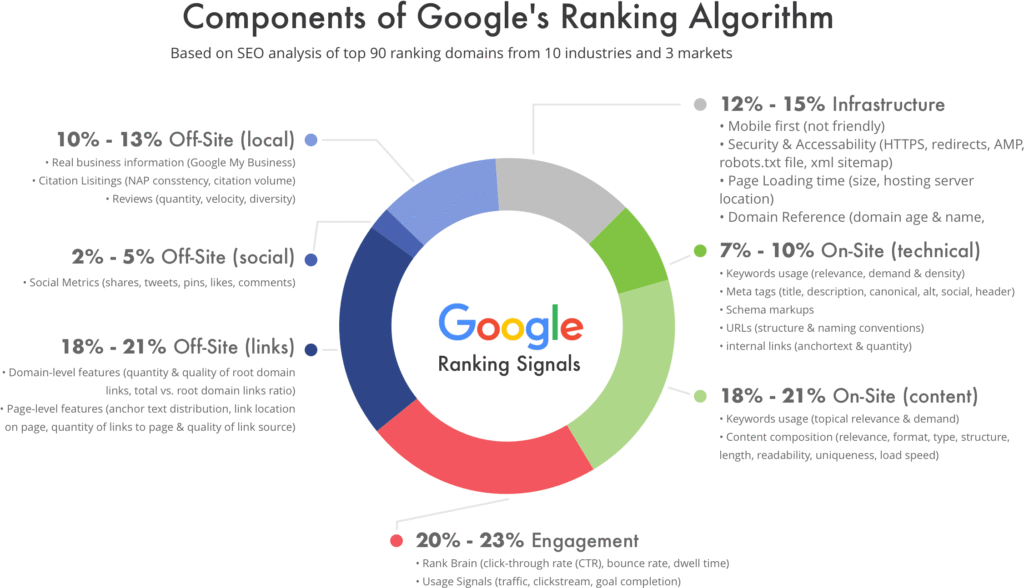
Let’s say your website has great content but loads painfully slow. Or maybe you’ve earned backlinks but have zero internal links. Those mismatches can dilute your SEO strength. Google wants to see consistency across your entire web presence. Every part of your site, from structure to code, speed, navigation, and even visitor behavior, helps Google determine if your content deserves to rank on page one.
Content Signals: What Google Looks for in Your Pages
Google has always prioritized relevant,, but it’s now measuring more than just word count or keyword usage. It’s looking at the entire structure of the page and how well it serves the user’s intent.
Well-organized content sends a strong message. Pages should have one clear topic, easy-to-follow subheadings, natural language, and original insights. That shows Google you’re not just recycling ideas.
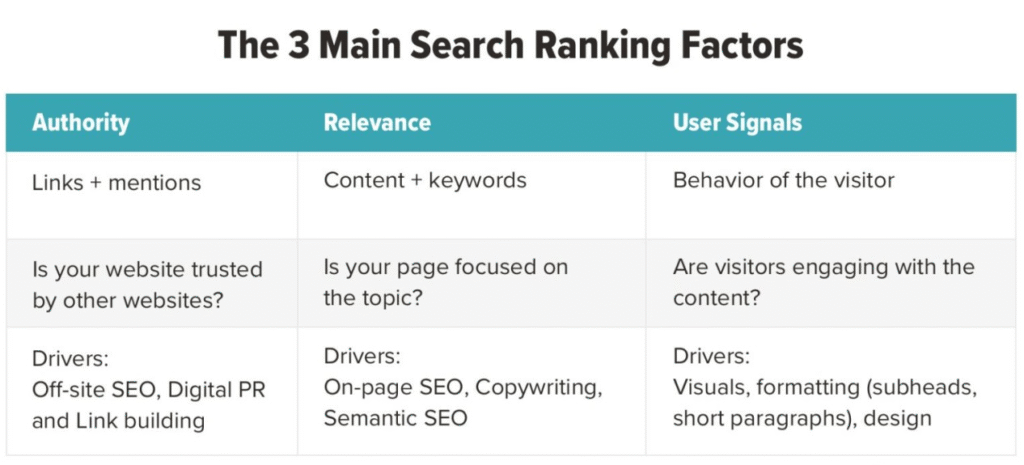
Content also needs to demonstrate experience, expertise, authoritativeness, and trustworthiness. This is often referred to as E-E-A-T. It’s not just for medical or legal websites. Even a local bakery needs to show expertise in its niche. Including author bios, linking to reputable sources, and keeping content updated all contribute to a stronger SEO signal.
Internal linking also plays a role. When you connect related pages using descriptive anchor text, you help Google understand your site’s structure and hierarchy. This reinforces your authority on the topic.
Keyword stuffing does more harm than good. Google looks for relevance, not repetition. Use long-tail keywords naturally, keep your content scannable, and match your writing to your audience’s search intent.
Technical Signals You Can’t Ignore
Technical SEO plays a major role in how Google crawls, indexes, and ranks your site. A slow-loading, poorly coded website with broken links will always struggle to rank no matter how good the content is.
Start with your website’s crawlability. Make sure your robots.txt file isn’t blocking important pages. Submit a sitemap to Google Search Console. Double-check that your main pages aren’t set to noindex by mistake.
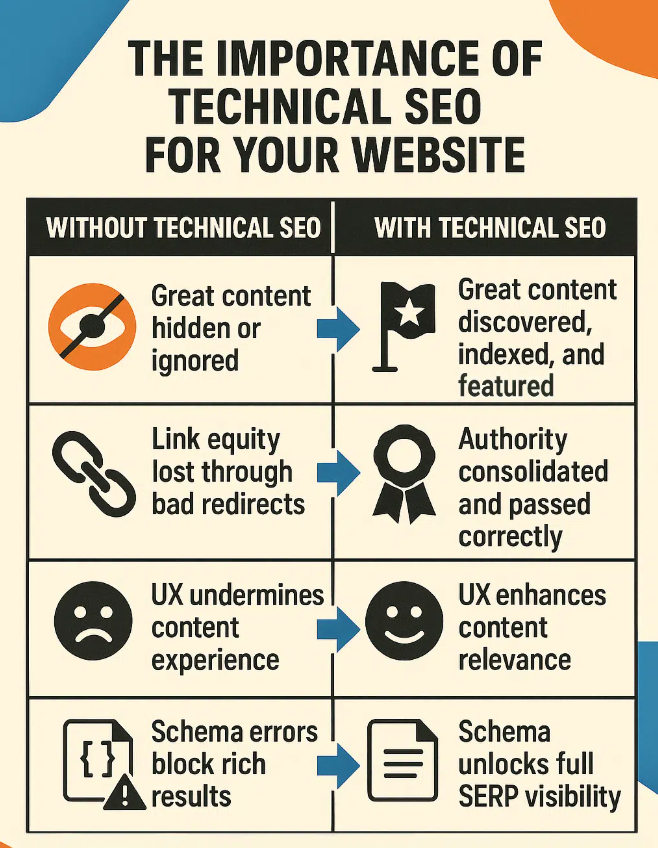
Mobile responsiveness is another major signal. More than half of global traffic comes from smartphones. If your site isn’t mobile-friendly, it’s already at a disadvantage.
Site speed is critical. Google uses Core Web Vitals to evaluate how quickly users can interact with your site. That includes metrics like Largest Contentful Paint and First Input Delay. Compress images, use a CDN, and minimize unnecessary code to improve load times.
Secure websites also get a boost. If you’re still running on HTTP instead of HTTPS, you’re sending the wrong signal. Users trust secure connections, and so does Google.
Schema markup gives Google extra context about your content such as reviews, FAQs, or service offerings. Structured data helps improve how your site appears in search results and enhances your chances for rich snippets.
Design Choices That Affect SEO
The visual layout and usability of your website send their own SEO signals. Poorly designed websites tend to have high bounce rates and low engagement, both of which suggest to Google that your content might not be very helpful.
Clean design helps keep users engaged. A logical structure with easy navigation supports positive behavior. Your navigation menu should be simple and easy to use. Group services or products into well-labeled sections. Use breadcrumbs and logical internal links to help users move through your site smoothly.
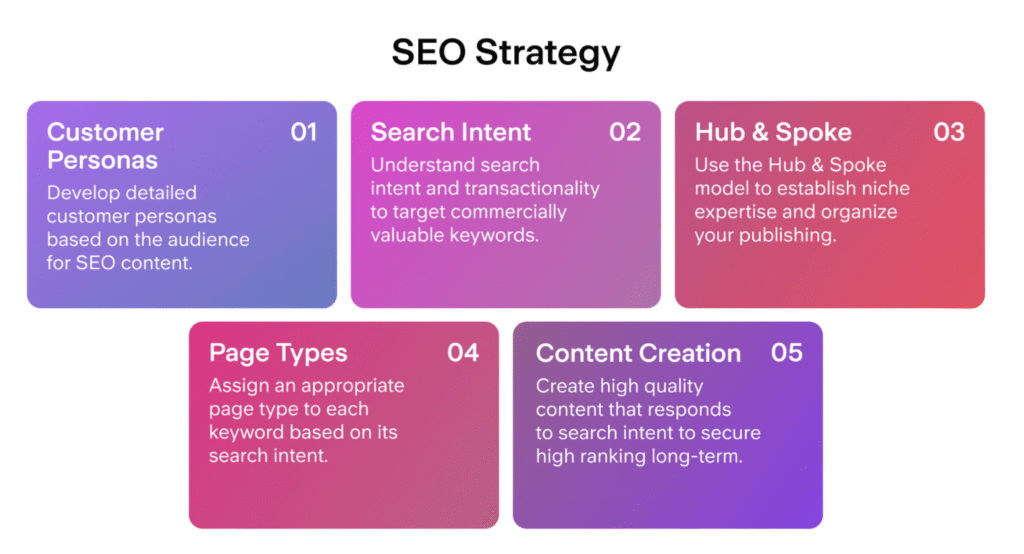
Also, make sure your site works equally well across all devices. Responsive design isn’t optional anymore. Your website should adjust properly on different screen sizes and devices without breaking layout or functionality.
Hosting and Website Performance
Your hosting provider can influence your site speed and reliability, which are both ranking factors. A slow or unreliable server will directly impact Google’s ability to crawl your site consistently.
Choose a reputable host that offers strong uptime, fast load speeds, and reliable support. Hosting should include automatic backups and updated server technologies. Pair that with a content delivery network to serve global audiences more efficiently.
Caching, minification, and lazy loading can also reduce strain on your server. Optimizing performance will give users a better experience, and that experience gets passed to Google through positive engagement metrics.
Behavioral SEO Signals From Your Users
Google watches how people interact with your content. Metrics like bounce rate, average session duration, and return visits all help search engines determine if your content meets expectations.
If people stay on your site longer and visit multiple pages, it sends a strong signal of relevance. If they leave quickly, it tells Google they didn’t find what they were looking for.
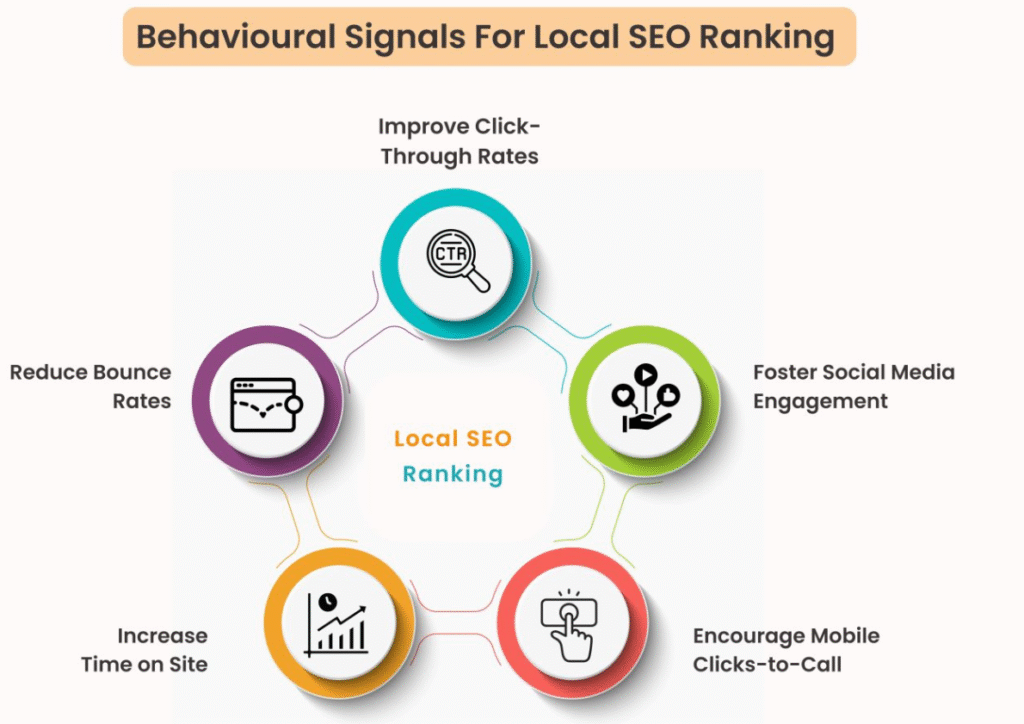
To keep users on your site longer, improve page layout, include internal links, and write content that’s easy to read and genuinely useful. Use a logical progression that makes people want to keep reading.
Click-through rates on interactive content also matters. A high CTR from search results indicates your listing is appealing. Your title tag and meta description should be written to catch attention while accurately reflecting your content.
Link Signals That Still Matter
Backlinks are still one of the most powerful SEO signals. Not all links are created equal though. Google values links from authoritative, relevant websites. Links from shady or irrelevant sites can actually hurt you.
Anchor text also plays a role. Natural anchor text that clearly describes the linked content is ideal. Avoid over-optimization, like using the exact same keyword phrase for every link.
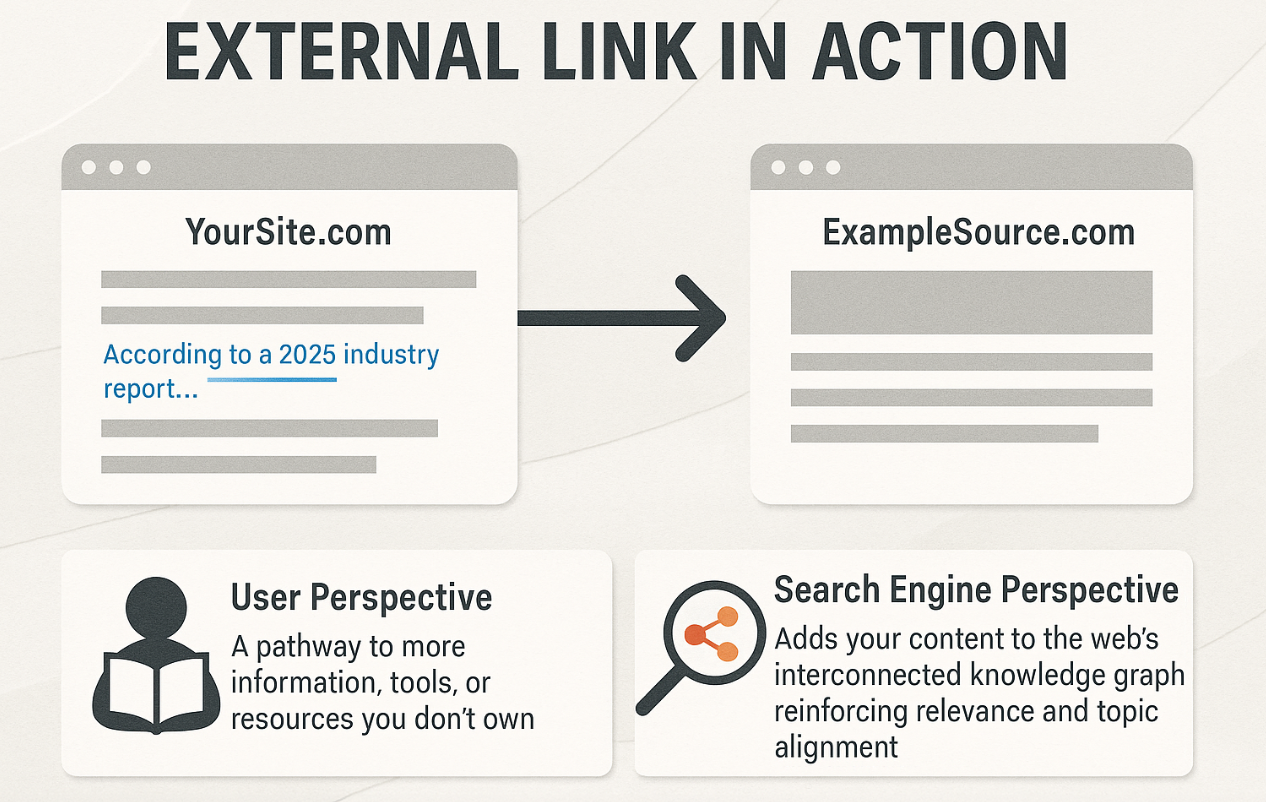
Create content worth linking to. Publish guides, case studies, or detailed answers to common questions. Promote this content through outreach and partnerships with other businesses.
Disavow toxic backlinks using Google Search Console if your site has been targeted with spammy link schemes. Keeping your backlink profile clean supports long-term ranking stability.
How to Evaluate Your SEO Signals
If you’re not sure what your website is currently signaling to Google, it’s time for a comprehensive audit. Use tools like Ahrefs to scan for performance issues, indexing problems, or missing metadata.
Evaluate technical setup, site speed, content quality, and user engagement data. Pay attention to internal linking structure, broken links, and unused or thin content. See how well your pages are ranking and whether you’re showing up for the keywords your audience actually uses.
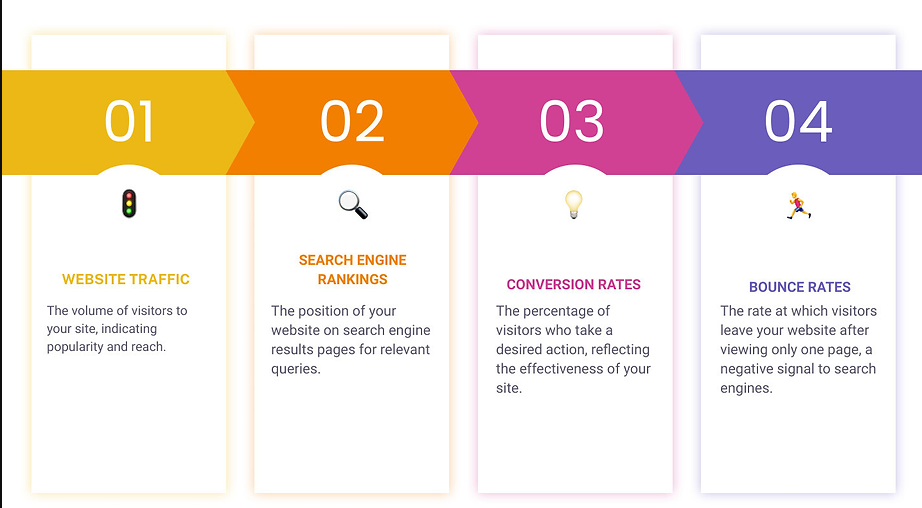
Compare these findings with competitors in your space. Are they publishing more frequently? Do they load faster? Does their navigation feel easier? Learning from what works in your niche can help you rebuild a stronger SEO foundation.
Getting Your SEO Signals Back on Track
If your site is underperforming, start by prioritizing content quality. Clean up low-quality pages and rewrite outdated content. Update titles, descriptions, and heading structures.
Then fix technical issues that might be blocking crawlability or slowing your pages down. Upgrade your hosting if needed, and implement caching or image optimization strategies.
Improve internal linking to guide users and search bots through your site logically. Make sure each page has a clear purpose and serves a specific search intent.
SEO isn’t something you do once. It should be part of your ongoing website maintenance and marketing strategy. Set a recurring schedule to revisit your audit, refresh content, and track rankings.
Frequently Asked Questions About SEO Signals
What are SEO signals?
SEO signals are the indicators that tell search engines how relevant, trustworthy, and user-friendly your website is. These include content quality, technical performance, backlinks, and user behavior.
How can I tell if my website has weak SEO signals?
You’ll usually notice poor rankings, low traffic, or high bounce rates. Tools like Google Search Console, Ahrefs, and Semrush can help you identify specific issues affecting your SEO signals.
Is mobile responsiveness really that important for SEO?
Yes. Google uses mobile-first indexing, meaning your mobile version is the primary version considered for rankings. A site that doesn’t perform well on mobile will likely rank lower.
Do backlinks still impact search rankings?
Definitely. Backlinks from authoritative and relevant sites remain one of the strongest indicators of trust and relevance. They act like endorsements in the eyes of Google.
How does site speed affect SEO?
Slow websites create poor user experiences and lead to higher bounce rates. Google factors this into your rankings through Core Web Vitals and overall performance data.
Can bad design hurt my SEO?
Yes. Difficult navigation, confusing layouts, and lack of responsive design all create a poor experience that sends negative behavioral signals to Google.
What is structured data and why does it matter?
Structured data, also called schema markup, adds extra context to your site content. It helps search engines display rich results like reviews or FAQs, improving your visibility.
Should I hire someone to fix my SEO signals?
If SEO feels overwhelming or you’re not seeing results, working with an experienced team can save time and deliver better outcomes. Experts can audit, fix, and optimize your site faster and more effectively.
Your Website is Always Communicating
Your website is always sending messages to Google. Some help your rankings. Others can hold you back. The key is making sure every element of your website works in harmony.
Improve your content, fix technical flaws, prioritize mobile performance, and watch your rankings begin to reflect those improvements.
If you’re not sure where to start, or need help strengthening your website’s signals, that’s exactly what we do.
Schedule Your No Obligation Call with Content Author today and let’s get your site back in front of the right people.
